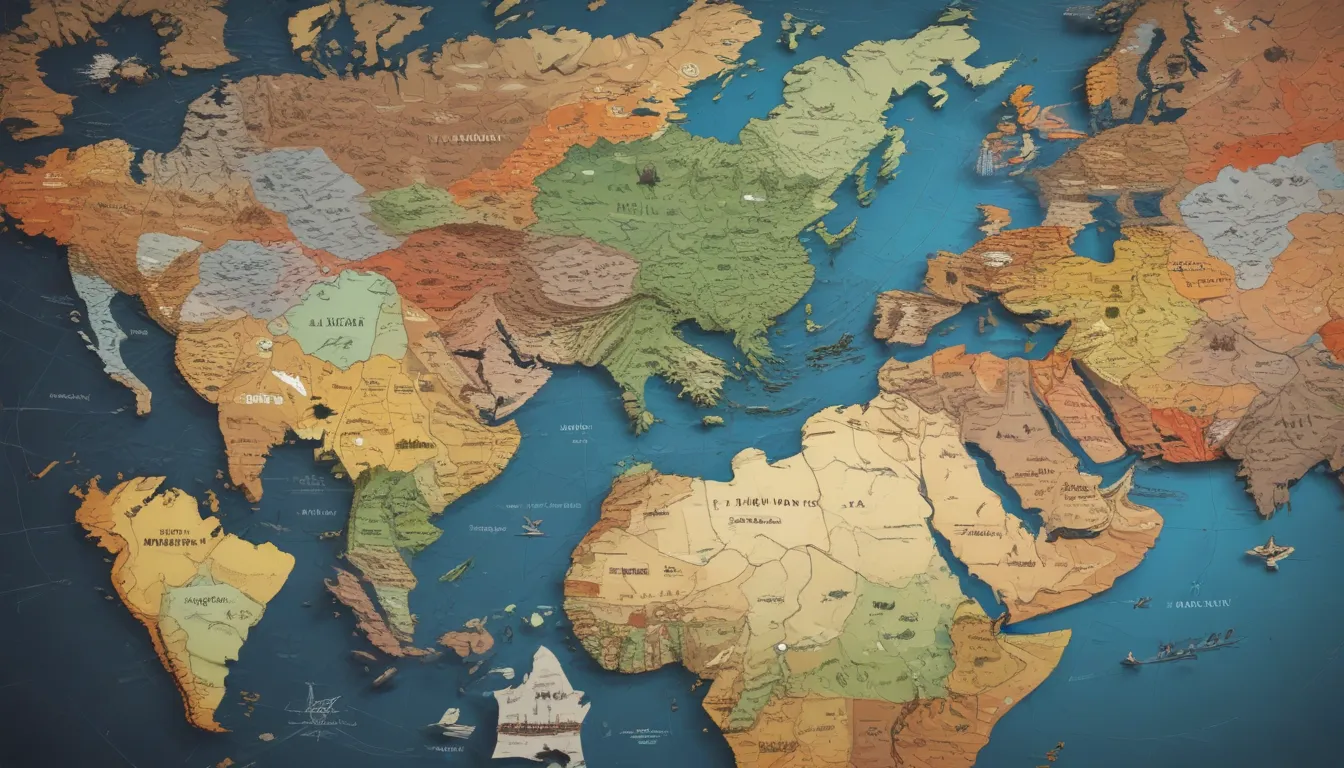A Note About Images: The images used in our articles are for illustration purposes only and may not exactly match the content. They are meant to engage readers, but the text should be relied upon for accurate information.
Territorial disputes and geopolitics have been pivotal elements of human history, shaping the global political landscape from ancient times to the present day. These conflicts, whether over land, resources, or borders, are not only intriguing but also offer valuable insights into power dynamics, diplomacy, and international relations.
Exploring Intriguing Facts
Let’s unravel nine fascinating facts about territorial disputes and geopolitics, shedding light on the complexities that drive conflict and tension worldwide. From the South China Sea to the Arctic, these disputes exemplify the intricate web of historical, economic, and cultural factors that underpin global politics.
Territorial Dispute in the South China Sea
The South China Sea, a strategic waterway in Southeast Asia, is at the center of a heated territorial dispute involving China, Vietnam, the Philippines, and other neighboring nations. This conflict revolves around competing claims over islands, reefs, and waters, with significant implications for regional security and resource exploration.
Kashmir Conflict between India and Pakistan
Since gaining independence, India and Pakistan have fiercely contested sovereignty over the picturesque region of Kashmir in the Himalayas. This longstanding conflict has led to military tensions, resulting in a heavily fortified Line of Control and a profound divide between the two nations.
The Falkland Islands Conflict
In 1982, Argentina and the United Kingdom engaged in a brief but intense conflict over the sovereignty of the Falkland Islands in the South Atlantic. Historical and geopolitical claims laid the groundwork for this confrontation, culminating in British forces reclaiming the islands.
The Israel-Palestine Conflict
The Israel-Palestine conflict is a complex territorial dispute rooted in claims to the same land by both Israelis and Palestinians. Decades of violence, diplomatic impasses, and international intervention characterize this multifaceted conflict over land ownership and national identity.
The Demilitarized Zone (DMZ) in Korea
The Korean Demilitarized Zone, established after the Korean War, symbolizes the ongoing ideological divide between North and South Korea. This heavily fortified border region reflects geopolitical tensions and serves as a buffer zone between the two nations.
The Russian Annexation of Crimea
In 2014, Russia’s annexation of Crimea, a region in Ukraine, sparked international condemnation and heightened tensions in Eastern Europe. Russia’s territorial ambitions came to the forefront, triggering ongoing discord with Western powers.
The Sino-Indian Border Dispute
The longstanding border dispute between China and India involves competing claims over vast Himalayan territories. Military standoffs and occasional skirmishes underscore the complex dynamics between these two Asian giants.
The Arctic Region and Resource Competition
The melting ice in the Arctic has led to heightened competition among nations like Russia, Canada, and the United States for access to the region’s abundant resources. Territorial disputes arise as countries vie for control over oil, gas, and minerals in the Arctic.
The Taiwan Strait Tensions
The Taiwan Strait, separating Taiwan from mainland China, remains a geopolitical flashpoint with implications for regional stability. China asserts Taiwan as its territory, while Taiwan upholds its sovereignty as a distinct entity, fueling ongoing tensions in East Asia.
Understanding the Significance
These nine intriguing facts underscore the complexities and global implications of territorial disputes and geopolitics. From historical conflicts to modern-day tensions, these disputes continue to mold international relations and shape the world we inhabit.
Conclusion: Navigating the Terrain of Territorial Disputes
Territorial disputes and geopolitics offer a compelling lens through which to view the intricacies of global affairs. Embracing a deeper understanding of these conflicts enables policymakers, scholars, and individuals to navigate the evolving dynamics of contemporary geopolitics. By engaging in informed discussions and promoting peaceful resolutions, we can contribute to a more harmonious global landscape.
FAQs: Unraveling Common Questions
Have burning questions about territorial disputes? Let’s address some common queries to deepen your knowledge.
What are territorial disputes?
Territorial disputes involve conflicts between countries or regions over the ownership and control of specific land or water areas, driven by historical, cultural, economic, or political factors.
What causes territorial disputes?
Territorial disputes can arise from competing historical claims, resource access, strategic significance, ethnic or religious disparities, or unresolved colonial legacies.
How are territorial disputes resolved?
Diplomatic negotiations, international arbitration, legal procedures, dialogue, compromise, and mediation play vital roles in resolving territorial disputes, facilitated by international organizations and third-party mediators.
Can territorial disputes lead to conflicts?
Yes, unresolved territorial disputes can escalate into conflicts, especially when significant economic or strategic interests are at stake, highlighting the potential for tension and armed confrontations.
Are there international organizations that deal with territorial disputes?
International bodies like the United Nations and the International Court of Justice facilitate negotiations, provide arbitration, and promote peaceful resolutions to territorial disputes, promoting stability and cooperation.
Are territorial disputes a common occurrence?
Territorial disputes are relatively common in global affairs as nations reassess boundaries and claims, giving rise to new tensions or reigniting historical disputes, underscoring the dynamic nature of geopolitics.
By exploring the intricacies of territorial disputes and geopolitics, we can gain a deeper appreciation for the complexities that shape our world. Embrace the journey of discovery as we unravel the tapestry of global affairs together.






